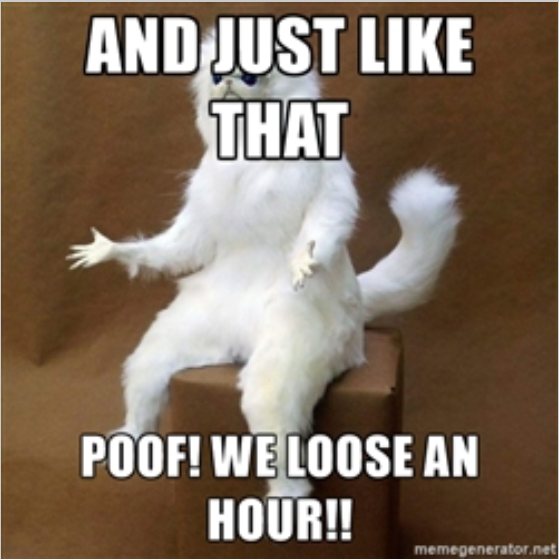Happy Monday, everyone! Well, for most of us in the US it may not be the happiest of Mondays due to the “spring forward” daylight saving time that stole an hour of our sleep this weekend!
Personally, I do enjoy having more daylight in the summer, but the clock change in the spring is tough, isn’t it? Even getting the hour back in the fall doesn’t work out so well when you have young kids as I do. Somehow their little bodies don’t get the message that we can all sleep in longer.
At every time change for daylight saving time, the memes come out about how pointless it is because you’re cutting off one end of a blanket and sewing it onto the other end. I won’t argue either side in this post because I can see the pros and cons of it, but I will protest the misuse of the word “loose” in regard to losing an hour in the spring.
I see memes like the following:

No, no, no! We are not loosing an hour; we’re losing an hour. This is one of those mistakes that I don’t understand because loose and lose have differing pronunciations as well as meanings. Lose is pronounced with a “z” sound while loose is pronounced with an “s” sound. They seem like very different words to me, but apparently that’s not the case for many people, so let’s discuss it.
The trusty site dictionary.com defines to lose (in the transitive form — subject of a future post!) as “to come to be without (something in one’s possession or care), through accident, theft, etc., so that there is little or no prospect of recovery.”
In contrast, to loose means “to let loose; free from bonds or restraint,” among various other definitions that include to unfasten, to release, to make less tight, to loosen, etc. I think of it as “to set something free.” A few years ago there was a popular book by the title Woman, Thou Art Loosed, as in, you are set free from your past.
The interesting difference in the two definitions is that the definition I quoted for lose was the first one, while the definition I quoted for loose was the twentieth definition and beyond! That’s because loose is most commonly used as an adjective. For example, in the past few years I often heard, “Mom! My tooth is loose! It’s about to fall out.”
A good way to remember the difference is that when you lose something you may try to search for it, but when you loose something you are letting it go.
As a typical American, I’m often trying to lose weight. I’ve heard a saying that if you lose weight you’ll find it again — frustrating, right? Perhaps I should loose it instead, so it won’t find its way back to me? Hmm, that may be a plan. If only I can get my metabolism to understand the difference between to lose and to loose…